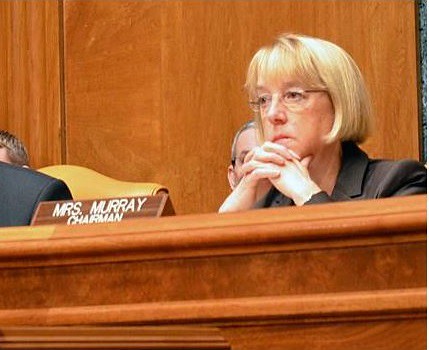Senator Murray Praises Bipartisan Deal to Tackle the Opioids Crisis in Washington State, Nationwide
Sep 10 2018
Bipartisan package includes over 70 proposals from five Senate committees; will get vote in full Senate soon
A longtime champion for
efforts to curb addiction, Senator Murray has traveled extensively
throughout WA for best practices to end opioid misuse, shared several
stories from WA patients & others that helped inform legislation
Senator Murray: “…by taking
ideas from all sides of the aisle and focusing on the root causes and
ripple effects of the opioid epidemic, the bill we are working on offers
a strong step in that direction”
(Washington, D.C.) – Led in part by efforts from U.S. Senator Patty Murray (D-WA), the Senate agreed to vote soon on the Opioid Crisis Response Act of 2018
(OCRA), a bipartisan package of over 70 proposals recommended to the
full Senate by the Senate Health, Finance, Judiciary, Commerce, and
Banking committees. The bill follows months
of work from Senator Murray and others focused specifically on finding
ways to leverage the federal government to help curb addiction in
communities ravaged by the opioids crisis in Washington state and across
the nation.
“The communities and families on the
frontlines of the opioid crisis want serious action to address the full
range of challenges they face, and by taking ideas from all sides of the
aisle and focusing on the root causes and ripple effects of the opioid
epidemic, the bill we are working on offers a strong step in that
direction,” said Senator Murray, ranking member of the Senate health committee.
“I’m glad so many members were able to come together to find common
sense solutions to help our families and those across the country
impacted by the battle with opioid addiction. I’ve heard so many people
in our state—including parents and patients, medical professionals and
educators, law enforcement officers and more—about the urgent need to
address this crisis, and I’ve brought their stories to the table while
my colleagues and I discussed and debated possible solutions. Now that
we have agreed on a bipartisan basis to quickly make additional changes
that will move the package forward, I look forward to getting these
steps signed into law.”
The Opioid Crisis Response Act of 2018 will:
Reduce Use and Supply.
The legislation includes the
STOP Act which will help stop illegal drugs at the border, as well as
provisions that provide flexible grants for states to better share
Prescription Drug Monitoring Programs data, clarify FDA authority to
require set packaging for prescription opioids, such as a 3 or 7 day
supply in a blister pack, and fight opioid diversion.
Encourage Recovery.
The
legislation includes provisions to support states and Indian tribes in
addressing substance use disorders, establish comprehensive opioid
recovery centers, expand access to medication-assisted treatment, and
improve community support, access to health professionals, tele-health
services and long-distance care, and recovery housing services.
Support Caregivers and Families.
The
legislation includes provisions to improve plans of safe care and
support for substance-exposed babies and their mothers, promote
family-focused treatment and recovery, help youth with substance use
disorders recover, and strengthen trauma-informed care and support in
schools and early childhood education programs.
Drive Innovation and Long-Term Solutions.
The
legislation includes provisions to advance cutting-edge research to spur
discovery and development of new non-addictive painkillers, address
economic and workforce impacts of the opioid crisis, ensure parity in
mental health and substance use disorder benefits, and improve pain
management.
As the top Democrat on the Senate health
committee, Senator Murray has worked at length to help find federal
solutions to the growing opioid epidemic in Washington state and nationwide, including successfully strengthening
federal investments in efforts to curb opioid misuse, and travelling
extensively throughout the state over the past several years—from Everett to Seattle to Longview,
and more—to meet with patients, families, health providers, medical
professionals, law enforcement officials, community leaders, and others
to better understand the impact of the opioid epidemic on families and
communities. In Washington D.C., Senator Murray has shared these stories
with her Senate colleagues as she has worked for policies that helped
address their needs. Additionally, Senator Murray has worked extensively
to strengthen federal investments in efforts to combat the growing
opioid epidemic, including championing
the Omnibus Appropriations bill enacted in March which provided $4.7
billion directed towards the opioid crisis and also included $1 billion
for grants to states.
The bipartisan agreement to move the Opioid Crisis Response Act of 2018
forward in the Senate also includes a bipartisan understanding about
important changes that will be made as it moves through the process and
before it gets signed into law.
Text reflecting the agreement can be found HERE.
